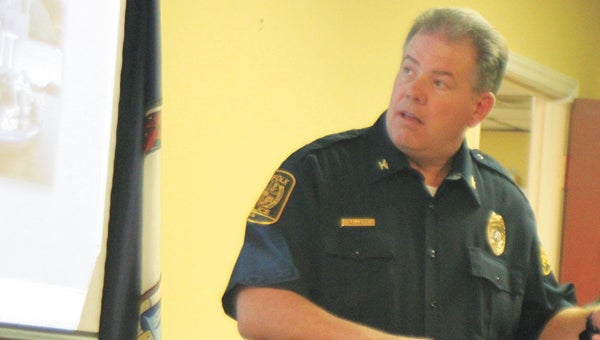Police chief addresses public housing violence
Published 9:55 pm Tuesday, September 24, 2013

Suffolk Police Chief Thomas Bennett discusses crime in public housing complexes during Tuesday’s Suffolk Redevelopment and Housing Authority Board of Commissioners meeting. Increasing foot patrols of uniformed officers would enhance police efforts to make communities safer, he said.
Increasing foot patrols by uniformed officers would help fight violent crime in public housing, but they wouldn’t come cheap, Suffolk’s police chief reported to housing officials Tuesday.
Suffolk Redevelopment and Housing Authority commissioners had invited Chief Thomas Bennett to discuss security in complexes, including Cypress Manor and Parker Riddick, after public concern over violent crime in those areas.
Directed patrols, in which a pair of uniformed police officers walk instead of ride through complexes, were introduced about two months ago in response to murders in Cypress Manor, Bennett said.
These patrols are occurring “fairly frequently,” but not every weekend, due to a lack of manpower, he said.
“They are able to check on things more thoroughly than just riding through in a car,” he said.
Other responses by police to the murders have included increasing intelligence efforts so officers know “who the players are and what they are doing,” Bennett said.
There has also been a no-tolerance approach to known offenders, which are placed on a “no trespassing” list banning their entry into complexes, he said.
“If we see them (inside complexes) again, there is no discussion — we arrest them,” he said.
He said police have also increased their focus on visitors to complexes, who are more likely to commit violent crime than residents.
“Doing some type of security at the complexes (in addition to the current foot patrols) would only enhance what we are trying to do,” Bennett said.
But the questions are “who does it, how do we do it and who pays for it,” he added.
Foot patrols are “probably needed” every weekend, Bennett said, adding, “Guards are better than nothing, but if you really want to make an impact — we are more expensive than guards, but we can get the job done. I think it would be a positive for everyone involved.”
Sending out two officers on a foot costs about $300 a night, Bennett said. The annual cost per community for two nights a week would be $31,000, Board Chairman Branch Lawson noted, asking if that would be an “effective use of money?”
“My people have said they have seen a dramatic decrease in the amount of general activity,” Bennett responded.
“When we go into a community and start letting our presence be known — more than usual — we will see a decrease.”
Any increase in foot patrols would be beneficial, he added.
Despite the discussion around stepping up patrols, Part I offenses on all SRHA properties have fallen 15 percent between 2010 and 2012, Bennett reported.
He said Suffolk is “very lucky,” noting the situation is much worse in Newport News, where he was previously deputy chief of police. “It’s a war zone in some of those places over there,” he said.
Clarissa McAdoo, the authority’s executive director, cited other efforts to reduce crime, including increasing ownership in the community through resident councils.





